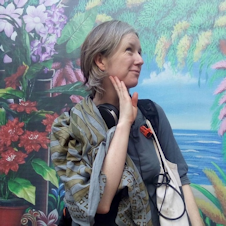Dr Ruth Kelly
Lecturer
Visit Dr Ruth Kelly's profile on the York Research Database to:
- See a full list of publications
- Browse activities and projects
- Explore connections, collaborators, related work and more
Profile
Biography
Ruth Kelly is a lecturer in human rights, based in Politics and the Centre for Applied Human Rights. She convenes the Human Rights Workshop – an interdisciplinary space for thinking creatively, critically and politically about rights. She also serves as Chair of the Board of Elect Her - a multi-partisan organisation working to motivate, support and equip women in all their diversity to stand for political office in Britain.
Ruth’s research is on human rights, deliberative democracy, and cultural politics. Since 2016 she has been working with artists and activists from Bangladesh and Uganda to explore the links between storytelling and the arts, deliberative practices, and the political imagination. This has included work on the ethics of North-South research collaborations, in the context of epistemic injustice and colonial legacies. During that time she has also supported programmes of peer-learning for human rights leaders and activists at risk, and research on sustaining activism over time.
Before taking up her post at York, Ruth held a post-doctoral fellowship at the Bonavero Institute of Human Rights at Oxford, supporting the Symposium on Strength and Solidarity for Human Rights. She has also held a fellowship at Yale University and a lectureship in Politics at the University of Durham. She has a background in law and politics, with a PhD in Politics from York, an LLM from Cambridge and an LLB from Trinity College, Dublin.
She has previously served as Chair of the Electoral Reform Society, and worked with ActionAid, Oxfam, UNDP and the European Commission.
Research
Overview
Ruth is interested in how people around the world draw on cultural and discursive traditions to make sense of the world and negotiate political change. She is currently working with artists and ethnographers in Bangladesh to explore how changing patterns of everday speech and sociality in public spaces shape socio-political imaginaries – how people conceptualise identity and belonging, relate to the natural environment and political borders, and make use of cultural traditions.
She looks at cultural and discursive practices not just as data to inform theory, but as a mode of political thought, which people use to theorise about their life worlds and articulate normative proposals that democratic theorists can learn from. Together with others doing engaged theory, in taking this approach, she seeks to better align democratic theory with the questions, goals and needs of communities struggling for justice around the world.
This builds on her previous work on public art, activism and the political imagination with colleagues in Bangladesh and Uganda. For example, she has carried out participatory and ethnographic research with writers and activists in Kampala to explore how deliberative engagement with myth can enable audacious claims and affirming negotiation, allowing participants to navigate the tension between their commitment to a given political community and their desire for that community to change.
As part of this work, she is learning from activists about the ideas and habits that shape, motivate, and sometimes limit their work. She is particularly interested in how human rights and feminist activists sustain their activism and political engagement over time.
She also has interests in the ethics of North-South research collaborations, the political cultures of human rights and development work, the politics of language, and religious practice and human rights.
Projects
Previous projects
Art, activism and the archive (GCRF, 2019-20)
With Shaela Sharmin and Shorab Jahan (Chittagong), Susan Kiguli (Makerere), and Emilie Flower (York)
Where historical or hegemonic scripts constrain the way that the future is imagined, this project explored how alternative archives can make space for counter-narratives and extend the scope of the political imagination. Interventions included arts exchanges, archive training, artist residencies, creative labs, arts based workshops, public conversations, street happenings, exhibitions and artist responses. Notably, the project supported activities within the innovative Cheragi Art Show in Chittagong, and an exhibition in the Uganda National Museum in Kampala.
Creative activism: art and development alternatives (GCRF/AHRC, 2016-18)
This project brought together groups of academics, artists and activists in Kampala and in Dhaka to explore how art could open space for the political imagination. Tapping into the rich cultural and artistic heritage of the places we come from, participants used art to experience the world differently and to dream up visions of a more just and sustainable world. Artists involved in the project created a series of artistic responses, which can be viewed online.
Supervision
PhD Supervision:
- Boluwatife Ajibola: Between protest sites and polling stations: Exploring the mobilisation of protest gains and losses for political expediencies
TAP member
- Kate Long: Common ground for a common future? Exploring dynamics of hybridity within environmental democracy
- Zulfiya Hamzaki (PhD by Creative practice): Enabling self-representation of refugee voices in British society through novel interactive documentary storytelling
Dr Ruth Kelly welcomes PhD applications in the following areas:
- Human rights and feminist practice
- Cultural politics
- Deliberative democracy
- Feminist theory
- Engaged and ethnographic approaches to political theory
- Politics of language
Publications
Selected publications
- R Kelly, 'Re-membering Red Riding Hood: situated solidarities between Ireland and Uganda' (2023) Feminist Theory 24(2), 208-226. doi:10.1177/14647001211043996
- R Kelly, 'Translating rights and articulating alternatives: rights-based approaches in ActionAid’s work on unpaid care' (2019) International Journal of Human Rights 23 (862)
- E Flower and R Kelly, 'Researching like an artist: disrupting participatory arts-based methods in Uganda and Bangladesh' in P Cooke and I Souria-Turner (eds), Participatory arts in international development (Routledge 2019)

Contact details
Dr Ruth Kelly
Centre for Applied Human Rights
University of York
YORK
YO10 5DD

